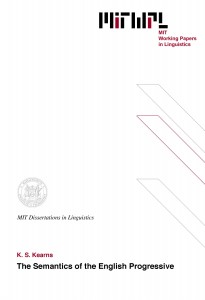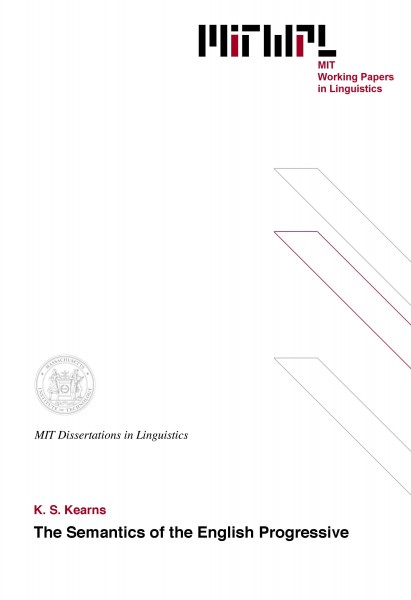The Semantics of the English Progressive
K. S. Kearns, 1991
This thesis proposes that the English progressive sematnically modifies the relation between events and times, and that this semantics uniformly underlies a variety of apparently disparate readings of the progressive. Chapter 2 begins with Jespersen"s observation that the progressive presents an event as a temporal frame around a given time. This intuition may be expressed as follows: where t is a given time, and t" is the time of an event e, a progressive sentence reporting e asserts that t", the event time, properly contains the framed time t. On this view, a progressive sentence entails the existence of an event of greater duration than the framed time t. I demonstrate that the temporal frame reading is not an entailment of the progressive but arises by implicature; the existence of an event of greater duration than the framed time t is implicated but not entailed. I also show that restrictions on the framed time t proposed elsewhere, claiming that t must be an instant, or that t must be non-initial and non-final in t", are incorrect.
Drawing on the contrasting readings of present progressive sentences and simple present tense sentences with event predicates, it has also been claimed that the progressive has a metaphysical character, reporting actual phenomena, while the simple present tense, interpreted as a habitual predication, reports characterisitics of the "structure of the world". I argue that the progressive/non-progressive contrast in the present tense is basically temporal: the progressive, unlike the (habitual) simple present tense, explicitly dates or temporally locates reported events. The different readings at issue follow by implicature arising from this contrast.
In Chapter 3 I address certain problems with the progressive of state predicates, including habituals. Having argued that the progressive is not ill-formed or false with state predicates per se, I offer an account of the temporary or limited duration reading of progressive state predicates in terms of the implicature outlined in Chapter 2 for the progressive/non-progressive contrast in the present tense. Drawing also on a modified version of Carlson"s (1977) distinction between individual-level and stage-level predications, I argue that where a simple tense state predicate has the individual-level reading, the progressive form implicates temporariness because it explicitly dates or temporally locates the state described. I also review a class of psychological state predicates, and argue that certain of these resist the progressive because the explicit dating of a state or event expressed by the progressive is anomalous.
A very old traditional observation, holding that the progressive is a "definite tense", contrasting with the "indefinite" perfect, is addressed in Chapter 4; definite tense forms make reference to specific times and indefinite forms to non-specific times. This classification is seen as resting on the pre-Russellian view of the articles a and the, developed more recently as the Familiarity Theory of Definitiness. I argue for a quantificational analysis of the novelty and familiarity effects, and claim that the original definite/indefinite classification of verb forms should be captured by differences in the quantification over times. In present perfect sentences event times are existentially quantified, and in progressive sentences the framed time is bound by quantificational the.
Finally, in Chapter 5 I discuss the Imperfective Paradox, and the two main types of response to it. Dowty (1979) is the chief example of the first approach, which is to analyse the progressive as a kind of counterfactual. I explore what I consider to be the essential components of this view, and argue that certain inadequacies indicate the correctness of the second view. The second view holds that the paradox is only apparent, as the predicate found in a progressive sentence is not the same as the predicate in the corresponding non-progressive sentence; the troublesome entailments are not valid on this view. I present additional evidence for the second view and also argue that the two distinct readings are found in the uninflected predicate, which is ambiguous.
Thesis Advisor: James Higginbotham
Title: Professor of Linguistics and Philosophy
Table of Contents
Chapter 1 General Introduction 9
Chapter 2 The Progressive as a Temporal Frame 33
The traditional view 33
An alternative analysis 38
Restrictions on the framed time 48
When-clauses and the sequential reading 53
Sequential when requires brief bounded events 54
Punctual events 59
Implications of causality 63
Summary: When-clauses 67
The present progressive and the simple present tense 68
Goldsmith and Woisetschlaeger (1982) 69
The simple present tense interpreted as habitual 75
The temporal range of habituals 77
Stage-level and individual-level predications 79
The quantificational structure of habituals 81
Adjectival and non-adjectival quantifiers 83
Adverbial quantifiers and habituals 89
Bare plurals 99
Event variables in habituals 102
Summary: quantification and habituals 108
Summary: the progressive as a temporal frame 109
Chapter 3 Predicates Which Resist the Progressive 111
State predicates 112
Progressive state predicates 122
Habituals as states 125
Formal statements 133
The BE class 137
The HAVE class 141
The psychological states 147
Participial adjuncts 159
Summary: state predicates 163
Acheivement predicates 166
Chapter 4 Definite and Indefinite Times 170
Introduction 170
The simple past 170
The perfect 175
The progressive 176
What is the "definiteness" of times? 184
Discourse representations 187
DRs and quantification 191
The perfect 203
The progressive 222
The simple past 228
Existential closure 233
Adverbial quantification 240
Chapter 5 The Imperfective Paradox 248
Michael Bennett: closed and open intervals 250
Dowty: the inertia worlds analysis 256
The basic counterfactual analysis 258
Achievement predicates 271
Processes 274
Progressives of telics with expressions of quantity 280
Unfinished objects 284
Where does the process reading come from? 292
Conclusion 301

